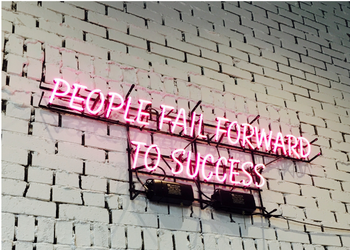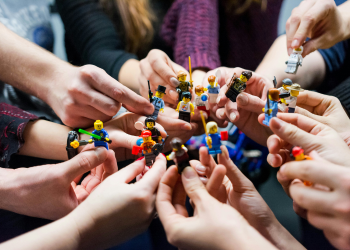If you have ever had a significant setback, made a serious mistake, or failed at completing an important task, you will have experienced some kind of deep emotional and visceral, largely unconscious, negative, reactive response to it. By becoming passively or aggressively externally defensive and blaming and punishing others for the outcome, or by withdrawing internally, and attributing self-blame and self-punishment for what may have happened. Everyone hates to fail because either type of reactive response stings and causes discomfort, dissonance, sorrow, suffering, and pain since you are feeling ashamed, judged, and shamed by yourself and by others. We need to re-think how we approach and digest failure, to scale and leverage it as one of our 21st-century superpowers.
Sabotaging your chances of success
According to a recent article in Psychology Today, this reactive response triggers your avoidance motivation, which then often exceeds your motivation to succeed!
Describing that the fear of failure causes us to then unconsciously sabotage our chances of success, as well as our ability to cultivate and manifest the superpowers necessary to thrive in the 21st century.
Self-doubt settles us into a denying the need to experiment, and a reluctance, full of excuses, to experiment further with adopting, iterating, and testing new and novel ideas. Or in taking smart risks, that help you connect, explore and discover and design opportunities for making important and necessary, personal and professional changes.
Pivot and adapt to disruptive events
Yet, our ability to experiment, test, validate and iterate creative ideas is critical to surviving and thriving through the current decade of both disruption and transformation – which more of us are viewing as a series of relentless, continuous, and exponential changes, requiring unlearning and radically new learning processes.
In a 2021 Deloitte survey of 2,260 private – and public-sector CXOs in 21 countries, 60% of the respondents said that they believe disruptions like those seen in 2020 will continue. The resulting challenge is underscored by another of the survey’s findings: Seventy percent of the CXOs do not have complete confidence in their organisation’s ability to pivot and adapt to disruptive events.
This confidence can be developed by re-thinking how we approach and digest failure, to scale and leverage it as a 21st-century superpower.
Developing 21st-century superpowers
Here are the four key superpowers, to be supported by digital technologies:
- Nimbleness: The ability to quickly pivot and move. (“We used to do this, and now we do that.”)
- Scalability: The ability to rapidly shift capacity and service levels. (“We used to serve x customers; we now serve 100x customers.”)
- Stability: The ability to maintain operational excellence under pressure. (“We will persist despite the challenges.”)
- Optionality: The ability to acquire new capabilities through external collaboration. (“Our ecosystem of partners allows us to do things we couldn’t do previously do.”)
Rethinking our fears of failure
None of these 21st-century superpowers can be developed without experimentation and collaboration.
Where you are able to self-regulate your fears of making mistakes and failure, by becoming a smart risk-taker who willingly, stretches the envelope and steps outside of your safety and comfort zones.
This helps maximise your potential and ability to learn and develop in the growth zone, where we stop self-sabotaging our chances of adapting and learning, succeeding, and growing in an uncertain and unstable world.
Everyone hates to fail because it’s hard to self-regulate the basic emotions of disappointment, anger and frustration, and deep shame. Resulting from and the distorted thinking patterns that accompany failure, often immobilising you which results in an unwillingness and inability to disrupt yourself and take intelligent actions.
Slow down to rethink, respond, regroup, play and thrive
It all starts with leading, teaching, mentoring, and coaching people to slow down, to learn, and appreciate the value of taking “time-out” for retreat and reflection.
At ImagineNation, in last month’s blog, we described how this involves developing regular reflective practices, where people can pay deep attention, and learn how to master these basic emotions and unresourceful thought patterns. How this allows them to be playful and experimental in developing new mindsets, rethinking habits, and resourceful emotional states, which are foundational for developing 21st-century superpowers.
Failure can become valued as a process and resource for effecting significant human-centric change, deepening learning, and improving your future-fitness.
Consequences of avoiding failure
According to the same article in Psychology today – “shame is a psychologically toxic emotion because instead of feeling bad about our actions (guilt) or our efforts (regret) shame makes us feel who we are”.
By getting to the core of your egos, your identities, your self-esteem, and your feelings of emotional well-being and resourceful thinking habits.
Because everyone hates to fail, we all unconsciously seek ways of mitigating the implications of a potential failure – “for example, by buying unnecessary new clothes for a job interview instead of reading up on the company – which allows us to use the excuse, “I just didn’t have time to fully prepare.””
Benefits of embracing failure
Rather than succumbing to the notion that everyone hates to fail, it is much more useful to develop healthier ways of embracing and flowing with it which might:
- Motivate you to reflect deeply to consider and deliberate as to what might be the most intelligent and brave actions to take under the range of circumstances you find yourself in.
- Inspire you to risk-taking those intelligent actions through developing sound risk anticipation, management, and mitigation strategies that help boost your confidence.
- Commit to doing just a bit more, in inventive ways that add value to the quality of people’s lives as well to your customer’s experience of your product or service.
- Encourage you to access your multiple and collective intelligence, be more courageous, compassionate, and creative in co-sensing, co-discovering, co-designing, and co-creating innovative solutions to complex problems.
- Enable you to learn from others, and harness people’s collective intelligence to adapt and grow, through teaming, in ways that serve the common good.
Tips for rethinking and self-regulating fears of failure
A few tips to support you to rethink, respond, regroup and thrive that we will explore more deeply, through real-life stories and examples, in our next two ImagineNation™ blog posts (November and December):
- Be willing to redefine and reframe failure as what it means in your unique context, review past failures and see if you can find benefits that resulted from them.
- Set approach goals and not avoidance goals to view failure as a challenge that can be mastered.
- Control the controllable by intentionally managing your mindsets, shifting any negative perspective, and unpacking distortion and generalisations about failures and their negative consequences.
- Imagine yourself doing well, achieving your goals by composing and painting a picture or image of a desirable and compelling future success.
- Develop healthy self-compassion for when you do mess up, make mistakes and fail, by being kind and understanding, and empathic to your won humanness.
- Focus on every experience, no matter what it brings is an opportunity for deep learning and creative and inventive change.
Rather than living in a world where everyone hates to fail, why not adopt the rethink, respond, regroup, thrive pattern, be future-fit and develop your set of 21st-century superpowers in the face of the acute disruption of COVID-19?
Where it is expected that the business environment, over the next three to five years, will be the most exciting and innovative period that many of us may learn from and experience in our lifetimes?
Want to know why you might have a fear of failure?
Participate in our online research study “Ten Signs you may have a fear of failure” which we adapted from the article “10 Signs That You Might Have Fear of Failure… and 2 ways to overcome it and succeed” by Guy Winch Ph.D. in Psychology Today. Click here to access the survey.
We will happily share the results and findings with you if you leave your name and email address on the form provided. By sharing these details, you will also qualify for a complimentary 30 minute one on one online innovation coaching session, with one of our global professionally certified coaches to help you overcome your own anxieties and fears about failure and develop your 21st-century superpowers.
Find out more about our work at ImagineNation™
Find out about our learning products and tools, including The Coach for Innovators Certified Program, a collaborative, intimate, and deep personalized innovation coaching and learning program, supported by a global group of peers over 8-weeks, starting Tuesday, October 19, 2021, and on Tuesday, February 2, 2022.
It is a blended and transformational change and learning program that will give you a deep understanding of the language, principles, and applications of a human-centred approach and emergent structure (Theory U) to innovation, within your unique context. Find out more











